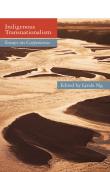AustLit
Latest Issues
AbstractHistoryArchive Description
'After Aboriginal author Alexis Wright’s novel, Carpentaria, won the Miles Franklin Award in 2007, it rapidly achieved the status of a classic. The novel is widely read and studied in Australia, and overseas, and valued for its imaginative power, its epic reach, and its remarkable use of language.
'Indigenous Transnationalism brings together eight essays by critics from seven different countries, each analysing Alexis Wright’s novel Carpentaria from a distinct national perspective. Taken together, these diverse voices highlight themes from the novel that resonate across cultures and continents: the primacy of the land; the battles that indigenous peoples fight for their language, culture and sovereignty; a concern with the environment and the effects of pollution. At the same time, by comparing the Aboriginal experience to that of other indigenous peoples, they demonstrate the means by which a transnational approach can highlight resistance to, or subversion of, national prejudices.' (Publication summary)
Publication Details of Only Known VersionEarliest 2 Known Versions of
Works about this Work
-
Review : Indigenous Transnationalism: Alexis Wright’s Carpentaria
2020
single work
review
— Appears in: Australian Humanities Review , May no. 66 2020;
— Review of Indigenous Transnationalism : Essays on Carpentaria 2017 anthology criticism'It must have been difficult to collect academic essays on a novel received with such a wide range of reactions as Alexis Wright’s Carpentaria. This applies to many books, but Wright’s case is remarkable. It took a while for Australians and the global readership to warm up to a 500-plus-page story about the uneasy relations between Indigenous and white culture in Australia’s Gulf of Carpentaria in northern Queensland. With sales and reprints pointing to the literary exceptionalism of Wright’s second novel, one may be surprised that Australia’s major publishing houses rejected the book; only for the small literary house of Giramondo to publish a milestone of Australian Literature in 2006. In their own ways, the invited contributions to Indigenous Transnationalism explain why that is.' (Introduction)
-
Lynda Ng (ed.), Indigenous Transnationalism: Alexis Wright’s Carpentaria
2019
single work
review
— Appears in: Southerly , vol. 79 no. 1 2019; (p. 193-198)
— Review of Indigenous Transnationalism : Essays on Carpentaria 2017 anthology criticism
-
Lynda Ng (ed.), Indigenous Transnationalism: Alexis Wright’s Carpentaria
2019
single work
review
— Appears in: Southerly , vol. 79 no. 1 2019; (p. 193-198)
— Review of Indigenous Transnationalism : Essays on Carpentaria 2017 anthology criticism -
Review : Indigenous Transnationalism: Alexis Wright’s Carpentaria
2020
single work
review
— Appears in: Australian Humanities Review , May no. 66 2020;
— Review of Indigenous Transnationalism : Essays on Carpentaria 2017 anthology criticism'It must have been difficult to collect academic essays on a novel received with such a wide range of reactions as Alexis Wright’s Carpentaria. This applies to many books, but Wright’s case is remarkable. It took a while for Australians and the global readership to warm up to a 500-plus-page story about the uneasy relations between Indigenous and white culture in Australia’s Gulf of Carpentaria in northern Queensland. With sales and reprints pointing to the literary exceptionalism of Wright’s second novel, one may be surprised that Australia’s major publishing houses rejected the book; only for the small literary house of Giramondo to publish a milestone of Australian Literature in 2006. In their own ways, the invited contributions to Indigenous Transnationalism explain why that is.' (Introduction)




